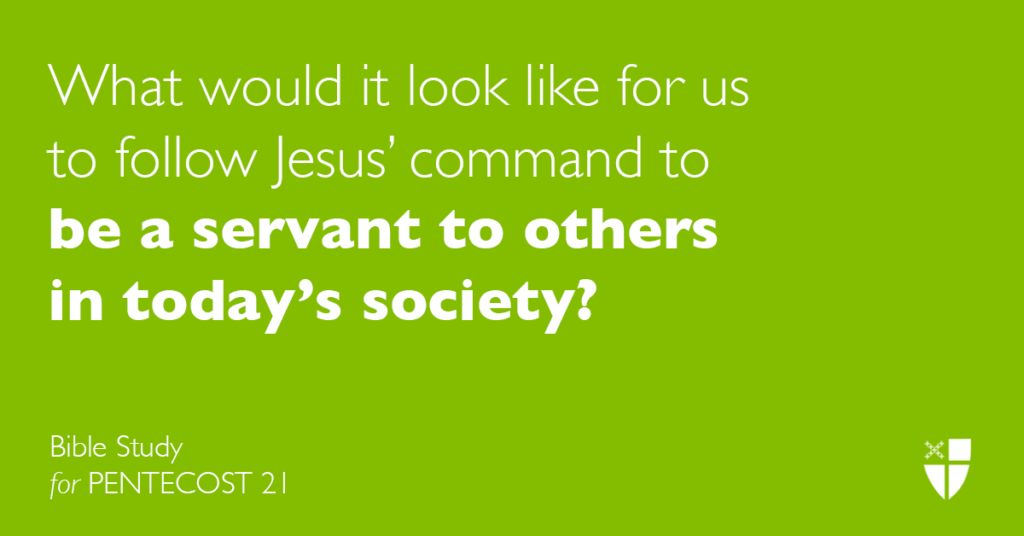Bible Study: Proper 24 (B) – 2021
October 17, 2021
RCL: Job 38:1-7, 34-41; Psalm 104:1-9, 25, 37b; Hebrews 5:1-10; Mark 10:35-45

Job 38:1-7, 34-41
We’ve been following the story of Job, a man who once had it all, and now he grieves the loss not only of his wealth and status, but also his children. Job has been pushed to the ultimate breaking point. He is at a complete loss as to how he is supposed to keep his faith in the God he loves when he has lost absolutely everything else.
This passage has fascinated readers for centuries, probably because this is the moment that God finally shows up for Job, and God shows up in a way that is completely unexpected from a benevolent, loving God. God has a knack for doing the unexpected.
What is unfathomable to Job is also unfathomable to us. If God is good, then why do bad things happen? God’s answer to Job shows of God’s goodness. Look at all of these wonderful things I have created. I have created a world full of good things that all interact with one another. Sometimes in those interactions, creatures are hurt. Job finds himself the victim of hurtful interactions with creation.
- What if you were at the point of despair, and all you wanted was an answer from God, and this was the answer you received? What would you think about God?
- Can you think of other times in scripture when God gives unexpected answers?
- Can you think of other victims in creation that suffer hurt from interacting with other creatures?
- What is one way we, as a human family, can lessen our negative impact on the other creatures that God has made?
Psalm 104:1-9, 25, 37b
In this psalm, we have another beautiful description of the good things that God has made. When one stands back to consider all the manifold works of the creator, it can be overwhelming.
It is often easier to see the glory of God in the majestic ocean or a beautiful mountain range than it is to see it in ourselves. The truth that we see in this psalm, as well as in Job, is that the same God that created the sun, moon, and stars also knit us together with the same care and love.
- Do you remember the first time you saw the ocean, or a beautiful mountain range? How did it make you feel about God?
- Why can it difficult for us to see ourselves as beautiful creations of God, fearfully and wonderfully made?
- Why is it hard sometimes for us to see one another the same way?
- In what ways does this hold us back?
Hebrews 5:1-10
“In the days of his flesh, Jesus offered up prayers and supplications, with loud cries and tears…” God chose to enter the world as one of God’s very own creations, a human being. And in God’s human state, God suffered all of the hurt and pain that humans face each day. God suffered ultimate betrayal and utter desolation. Sometimes it is impossible to find good news when we, like Job, are lost in a sea of pain and confusion. The good news is not that God will take our pain away, but that God will walk with us in that pain, and that God knows our pain intimately, as if it were God’s own.
- Take a moment to think about a time you have felt pain. Tell God what that pain was like for you, and ask God where he/she was.
- Think about what words of comfort God might offer you next time you are feeling pain. Share with a group if you’d like.
Mark 10:35-45
Here we have another surprising answer from God. James and John ask Jesus how to become the greatest, and Jesus says that to become great you must be a servant to others, and to be the first, you have to be a slave to all.
- How does this contradict what you might think about how to become great?
- What does our society teach us about how to become great?
- What would it look like for us to follow Jesus’ command to be a servant to others in today’s society?
- How can we better serve not only one another, but also the other beautiful creatures God has made?
¡No olvide suscribirse al podcast Sermons That Work para escuchar este sermón y más en su aplicación de podcasting favorita! Las grabaciones se publican el jueves antes de cada fecha litúrgica.


